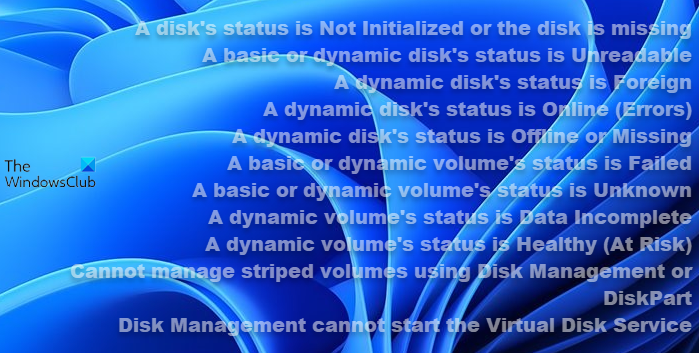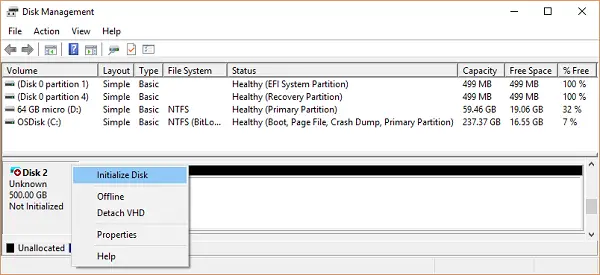Disk errors are one of the most common errors on Windows 11/10. It is also scary because all our data are on the disk drives, and even with backup in place, its time consuming to restore all of them. That said, most of these disk errors can be resolved, and this is exactly what we are going to talk about in this post. Check out the best tips for troubleshooting common Disk Management error messages on Windows 11/10.

Fix Disk Management errors on Windows 11/10
This post will help you fix Disk Management errors like:
- A disk’s status is Not Initialized or the disk is missing,
- A basic or dynamic disk’s status is Unreadable,
- A dynamic disk’s status is Foreign,
- A dynamic disk’s status is Online (Errors),
- A dynamic disk’s status is Offline or Missing,
- A basic or dynamic volume’s status is Failed,
- A basic or dynamic volume’s status is Unknown,
- A dynamic volume’s status is Data Incomplete,
- A dynamic volume’s status is Healthy (At Risk),
- Cannot manage striped volumes using Disk Management or DiskPart,
- Disk Management cannot start the Virtual Disk Service.
Before we start, remember two things. First, you need an account with administrator privileges. Second, be very very careful using the disk management tools. One mistake, and you can lose all your data, and there is no way to undo things without losing the data on those drives.
To open Disk Management tool, follow the below steps:
- In the Run prompt, type
compmgmt.msc, and hit Enter. - This will launch the Computer Management console.
- Select Storage > Disk management. This will list all the drives and partitions inside them.
Pre-checks:
- I am assuming that your drive is properly connected to the PC, and if it’s an external drive, it is connected properly to the USB port.
- Make sure to check this before starting, and always try connecting to another PC to see if it works there.
- If the device works on another PC, try running the Disk Error Checker.
A disk’s status is Not Initialized or the disk is missing
Many a time your partition or drive does not appear in File Explorer. To check if it’s physically there, open the Disk management. Check if you see it as Not Initialized. If yes, then it simply means that the disk doesn’t have a valid signature, i.e., it’s not properly registered with the system. A disk is registered when you format it at least once. If the disk was available before, then it’s probably corrupted somehow.
If it is a new drive, you can simply initialize it; however, if that’s not the case, we need to try other solutions.

Bring it Online & Add Drive Letter:
- If in the Disk Management, it appears to be offline, then right-click, and select Online.
- If the disk is already online but has no drive letter (e.g., C, D, E, etc.) then right-click, and select change drive letter, and path. Choose a letter that is not already allocated.
- Lastly, you can choose to format it in either NTFS or FAT32. If you are using 64bit, make sure to use NTFS. This will remove all the data from your disk.
Check Device Manager for issues.
It is possible that because of driver issues, the hard drive is not working properly. It’s always a good idea to check on the Drive Manager to see that the drive listing has a yellow exclamation mark next to it. If that’s the case:
- Right-click on the hard drive listing and select uninstall the drive.
- Next, click on Action, and run Scan for hardware changes.
Similar: All options greyed out in Disk Management.
A basic or dynamic disk’s status is Unreadable
If you are facing this problem, the chances are that your hard drive has experienced a hardware failure or some irreversible corruption. It is also possible that the system’s disk configuration database might be corrupted, and the error message you will get in that case is ‘Unreadable’. You can try it on some other computer, but replacing your hard drive is the only solution here.
Read: SSD not showing up in Disk Management or BIOS in Windows.
A dynamic disk’s status is Foreign
When you move a dynamic disk from one computer to another, you will get a warning icon next to it with Foreign status. Dynamic disks offer the ability to create fault-tolerant volumes that may even span multiple disks – which Basic disks cannot. When you create a dynamic disk, the configuration disk is stored on all dynamic disks, and the information of who owns is lost when switching between PCs.
The solution is to make use of the Import Foreign Disks option. All you need to do is right-click on the disk and use the option. After you import the disk any existing volumes on the foreign disk become visible and accessible when you import the disk.
Now that you know of Dynamic Disk, here is the list of errors, and their solution around Dynamic Disk.
A dynamic disk’s status is Online (Errors)
To resolve this, you need to reactivate the disk to return it to Online status. Just right-click, and you will have that option. This works if the I/O errors are temporary.
A dynamic disk’s status is Offline or Missing
In case the dynamic disk has been corrupted or intermittently unavailable, it will appear as offline. Also, the disk name changes to missing. It is possible that it is either powered down or disconnected. Make sure that the disk has power. Plug it back in, and if it appears in the tool, right-click Reactivate Disk.
If this doesn’t work, nothing can be done. All you can do is right-click and choose Remove Disk. However, before doing that, delete all volumes (or mirrors) on the disk. To save the data, you can save any mirrored volumes on the disk by removing the mirror instead of the entire volume.
To bring a disk that is Offline and is still named Disk # (not Missing) back online:
- Try to Reactivate Disk to bring the disk back online
- Check-in Event Viewer if you have an error that says “No good config copies”. If yes, the Microsoft Product Support team might help you.
- Try connecting to another computer, especially with that which has dynamic disks. If it gets online, import the disk on that computer, and bring it back to the PC on which it wasn’t working.
A basic or dynamic volume’s status is Failed
Again, this is a clear case of a damaged disk or corrupt file system. You need to check on the power status or try the steps we shared for ‘A disk’s status is Not Initialized or the disk is missing’. This applies to basic disks, but if that’s a dynamic disk, then right-click and see if you can get it online.
That said, if the dynamic volume is a mirrored or RAID-5 volume with old data, bringing the underlying disk online will not automatically restart the volume. You will need to bring the other connected disks online first, so it makes sure the data is in sync, and then restarts the mirrored or RAID-5 volume manually, and then run the Error-checking tool or Chkdsk.exe.
A basic or dynamic volume’s status is Unknown
In this state, the boot sector of the volume is corrupted, and the data is no longer available. It is also possible that the new disk setup wasn’t complete. To resolve, you need to Initialize it again.
- In Disk Management make sure to check if the status is Online, else you need to bring it online first.
- Then right-click on that disk and click Initialize Disk.
- Then click on Ok to accept the default partition style
- After the wizard completes its job, you should have access to it.
A dynamic volume’s status is Data Incomplete
Windows 10 supports multi-disk volume. If you have removed one of the disks and moved it to another computer, it will not work, and will also destroy all the data unless you move and import the remaining disks that contain this volume.
So the solution is to move all the disks which are part of the multi-disk volume to the computer and import it. The disks will be marked as a Foreign disk. We have already stated above on how you can import, and activate those disks.
A dynamic volume’s status is Healthy (At Risk)
If one of your dynamic volumes is marked as at Risk, even if they are healthy, it indicates that there are some IO errors on the underlying part. It could be because of the one on the disk, but it makes all the volumes are Risk. One of the disks must have gone offline.
To resolve this, you will need to bring back the disk to Online Status, and it will restore the status, but if that doesn’t work, you will need to replace that disk
Cannot manage striped volumes using Disk Management or DiskPart
There are tons of Disk Management tools available. If you are using one of them, it is possible those products might have replaced the Microsoft Logical Disk Manager (LDM) for advanced disk management. Sadly, you need to connect with the support team to get this resolved.
Disk Management cannot start the Virtual Disk Service
This usually appears when the remote computer is blocking the Virtual Disk Service (VDS) because of the Firewall or the remote computer doesn’t support VDS at all. VDS service allows one to remotely connect to another computer Disk Management tool, and then let the admin configure it.
You can either configure Windows Defender Firewall to enable the Remote Volume Management Exception or remote login to that computer and then use Disk Management.
Source: Microsoft.com.